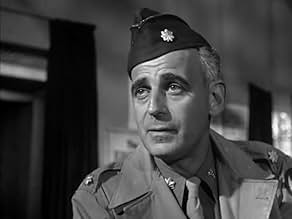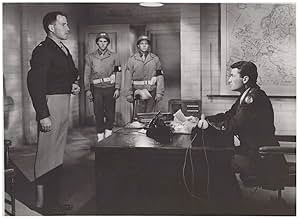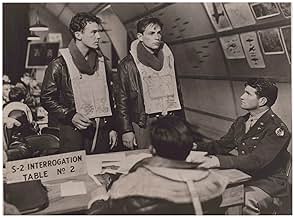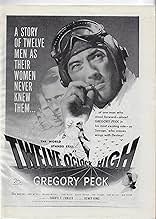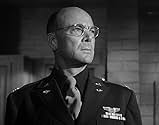A tough-as-nails general takes over a B-17 bomber unit suffering from low morale and whips them into fighting shape.A tough-as-nails general takes over a B-17 bomber unit suffering from low morale and whips them into fighting shape.A tough-as-nails general takes over a B-17 bomber unit suffering from low morale and whips them into fighting shape.
- Won 2 Oscars
- 9 wins & 5 nominations total
- Lt. Bishop
- (as Bob Patten)
- Lt. Zimmerman
- (as Lee Mac Gregor)
- Officer
- (uncredited)
- Radio Operator
- (uncredited)
- Clerk in Antique Shop
- (uncredited)
- Operations Officer
- (uncredited)
- Mr. Britton
- (uncredited)
- RAF Officer
- (uncredited)
Featured reviews
Following the intro with Dean Jagger, the action gets off to a good start with the B17 crash landing, a man staggering out to vomit, a reference to a wounded man's brain being visible and an account of Bishop's bravery. This is strong stuff for 1949.
It avoids a lot of war film clichés. There's no love interest (there's even a nod to the fact that the men weren't always faithful to their loved ones back home). There's no attempt to create a group of men who represent the breadth of society back home. You know the sort of thing - the New York cabbie, the young farm boy, the Texan, the idealistic schoolteacher, the journalist, the architect who's now bombing things that he once built. And it's about failure, it's about men destroying their bodies and their minds for something they don't understand. It reminds me of the colour-sergeant's reply to a soldier in Zulu, who asks 'Why us?'. 'Because we're 'ere, lad. Just us. Nobody else.' If I wanted to sound pretentious, I'd use the word 'existential'.
It's about leadership and is similar to Nortwest Passage. Both Spencer Tracy in that film and Peck in this are aware that they are putting on an act. One of the great scenes is Peck arriving at the base. He's sitting in the front of the car. They stop and Peck offers his driver, whom he calls 'Ernie', a smoke. He thinks for a while, then grinds out his cigarette, says, 'Right, sergeant.' His driver snaps open the rear door and Peck becomes the general. Northwest Passage again - Tracy says 'I'm not a man now, I'm an officer responsible for men. If you meet me when I'm just a man, you might have to use a little charity.' Other nice touches: the way the fur-lined RAF boots become the symbol of leadership. The way the real-life footage is dovetailed into the main action, a tribute to the war-time cameramen as much as the editor. Notice how they filmed detail like empty shells falling to the aircraft floor.
So how could a film about military leadership help a local government manager, of all people. I couldn't bust people or demote them easily, rearrange their duties with a stroke of the pen. I would have loved to set up a leper colony, but the union wouldn't let me. But Peck's stressing of the need for pride in one's group is something that can be transferred to any walk of life.
Gregory Peck as Brigadier General Frank Savage did great credit to this role, and deserved an Oscar. From the moment he enters the base and tears into the guard at the gate for casually waving him through, you know he's going to be a S.O.B. Dean Jagger as Major Stovall, the lawyer in uniform now Ground Executive Officer knows how to handle the paperwork after the first sobering face to face encounter with with Savage. That Jagger won the Oscar as best supporting actor, was well deserved indeed. Gary Merrill as Colonel Keith Davenport, the too popular Group CO, very good. Hugh Marlowe as Lt Colonel Ben Gately, who flew too many missions from behind a desk, placed on the rack by Savage with the other bomb group deadbeats and foul ups, handles his role well. Then their's Millard Mitchell as Major General Pritchard, displaying a commanding presence, and Paul Stewart as Doc Kaiser, also well portrayed.
There are no false heroics in this movie. No blood and guts all over the silver screen. And no routine world war two, hard boiled, go-get-'em dialogue to spoil it. The authors, Sy Bartlett and Beirne Lay. wrote an excellent screenplay. They did the film a favour, they deleted General Savage's love interest that appeared in their fine novel. I don't think it would have added anything to the movie at all. Maybe what surprised a lot of moviegoers who had not read the book before seeing the movie, was Savage's mental breakdown; freezing suddenly at the hatch as he attempted to heave himself aboard the B-17. It was so unexpected of him after showing such ice-cold nerves
What rounded out this impressive movie was the insertion of the air combat footage shot over Europe during the actual daylight operations. This documentary footage crowned a very fine achievement. One of Henry King's best; a professional effort indeed. The thread of sincerity in this war movie runs deep.
The reason I found the movie so engrossing was, as a teenager, on the sidelines of the war, I saw more than one B-17 stagger home and belly in on a wing and a prayer. This movie was loaded with integrity from the beginning to the end credits. I'm sure the gallant gentlemen who flew with the Eighth Air Force over enemy-occupied Europe would be of the same opinion. It is a kind of monument to those warriors.
Did you know
- TriviaThis film is used by the US Navy as an example of leadership styles in its Leadership and Management Training School. The Air Force's College for Enlisted Professional Military Education also uses it as an education aid in its NCO academies and Officer Training School. It is also used as a teaching tool for leadership at the Army Command and General Staff College and for leadership training in civilian seminars. It is used at the Harvard Business School as a case study in how to effect change in organizations.
- GoofsSavage is given command of the 918th and tells Pritchard that he'll get there "early" the next day. By the time he does arrive, Lt. Zimmerman has committed suicide, been given a funeral and Major Stovall has had time to get drunk afterwards.
- Quotes
General Savage: I take it you don't really care about the part you had in breaking one of the best men you'll ever know. Add to it that as Air Exec you were automatically in command the moment Colonel Davenport left - and you met that responsibility exactly as you met his need: you ran out on it. You left the station to get drunk. Gately, as far as I'm concerned, you're yellow. A traitor to yourself, to this group, to the uniform you wear. It would be the easiest course for me to transfer you out, to saddle some unsuspecting guy with a deadbeat. Maybe you think that's what you're gonna get out of this, a free ride in some combat unit. But I'm not gonna pass the buck. I'm gonna keep you right here. I hate a man like you so much that I'm gonna get your head down in the mud and tramp on it. I'm gonna make you wish you'd never been born.
Lt. Col. Ben Gately: If that's all, sir...
General Savage: I'm just getting started. You're gonna stay right here and get a bellyful of flying. You're gonna make every mission. You're not air exec anymore. You're just an airplane commander. And I want you to paint this name on the nose of your ship: Leper Colony. Because in it you're gonna get every deadbeat in the outfit. Every man with a penchant for head colds. If there's a bombardier who can't hit his plate with his fork, you get him. If there's a navigator who can't find the men's room, you get him. Because you rate him.
- Crazy creditsOpening credits prologue: LONDON 1949
- ConnectionsEdited into La guerre, la musique, Hollywood et nous... (1976)
- SoundtracksDon't Sit Under the Apple Tree
(uncredited)
Music by Sam H. Stept
Lyrics by Charles Tobias and Lew Brown
Sung at the officers' club
- How long is Twelve O'Clock High?Powered by Alexa
Details
Box office
- Gross worldwide
- $4,499
- Runtime
- 2h 12m(132 min)
- Color
- Aspect ratio
- 1.37 : 1



